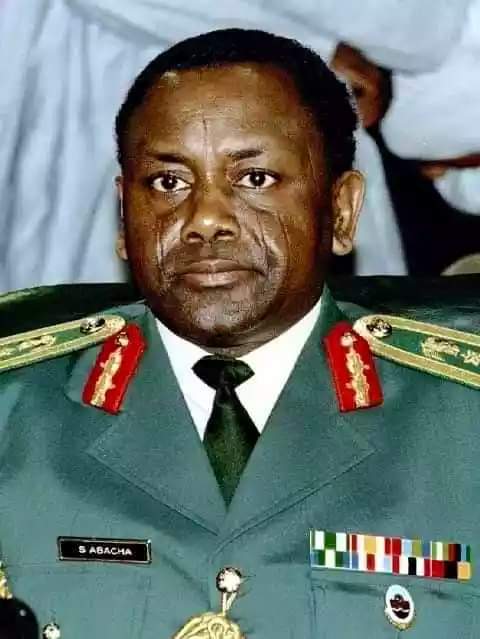He came at a time Nigerians were praying for a ‘change’. When he ascended the throne on November 17, 1993, it was with an air of discreet gentility. But five years later, Nigerians were writhing in pain.
GABRIEL AKINADEWO writes on the 22th anniversary (June 8, 1998) of the day General Sani Abacha became history.
He never pretended to be in the class of an academic professor. He never told anyone that he had the intellectual capacity to solve Nigeria’s problems. He was, first and last, a soldier. A crude one for that matter. His hold on Nigerians was unquestionably colossal, brutal and maximum.
When General Sani Abacha became the 10th Commander-in-Chief of the most-populous black nation on November 17, 1993, all those who knew him believed that it wouldn’t be long before Nigerians knew that they were in for a tough time. And for close to five years, Abacha really showed them the stuff he was made of.
22th anniversary: Day Abacha became history
The first thing he did was to trick the winner of the June 12, 1993 presidential election, the late Chief Moshood Kashimawo Olawale (M.K.O.) Abiola, to send representatives that would serve in his regime.
This pact led to the entrance of Chief Ebenezer Babatope, Alhaji Lateef Jakande and Chief Olu Onagoruwa as ministers.
When Abiola realised that he was riding on a tiger’s back, it was too late. With agitation for the revalidation of Abiola’s mandate reaching a peak, Abacha came out smoking.
Some people were sent into exile, a few killed. Others were clamped in detention. Nigerians were not sure of their future.
Abacha’s style of leadership, especially his foreign policy, led to the suspension of Nigeria from The Commonwealth.
Nigeria became a pariah nation.
What he lacked at home, he preached abroad. There was no democracy in the land but the dark-goggled General went to Liberia to witness the inauguration of Charles Taylor as President. He also sent soldiers to Sierra Leone to restore Teejan Kabba.
To his credit, Abacha tackled youth restiveness in the Niger Delta. All the militants became ‘born again’ youths when they realised he was ready to level the South-South geo-political zone with his no-nonsense aggressive military policy.
Nigeria also won the Nations Cup in 1994 and participated in the World Cup for the first time same year. In 1996, the Under-23 football team won the gold medal during the Atlanta Olympics Games with Chioma Ajunwa winning gold in the long jump.
22th anniversary: Day Abacha became history
When the British Airways engaged in a battle of supremacy with the Federal Military Government (FMG), Abacha sent the airline packing.
It was in this state of panic that Nigeria was when something happened on June 8, 1998.
Those who referred to Abacha as the most hated ruler in Nigerian history, in and out of office, were vindicated on that Monday when the news of his death hit the streets.
There is the age-long belief that you don’t rejoice over the dead, an unwritten rule that you must not speak ill of the dead.
But 22 years ago, Nigerians flouted that rule. To them, they were only following the footsteps of Abacha who never respected any rule while in office.
22th anniversary: Day Abacha became history
On June 7, 1998, Abacha received the Leader of Palestine Liberation Organisation (PLO), the late Yasser Arafat, at the Nnamdi Azikiwe International Airport, Abuja.
Arafat was on his way to attend a meeting of the Organisation of African Unity (OAU), now African Union (AU), in Burkina Faso.
22th anniversary: Day Abacha became history
That was the last time Nigerians saw Abacha alive.
The next day, the main event in Abuja was the official opening of a three-day seminar on a new information strategy. Abacha was billed to declare it open at the International Conference Centre (ICC), Abuja.
As usual, security was very tight. Stern-looking soldiers and security men, some wearing Russian-made long coats, frisked journalists and participants entering the hall.
Obviously, they were oblivious of what happened a few hours earlier at The Villa.
22th anniversary: Day Abacha became history
Although Abacha suffered from liver cirrhosis, there were various versions of the circumstances surrounding the death of one of the most successful coup plotters in Nigerian history.
For reasons bordering on the phobia of power loss, he snubbed medical options of treating himself properly abroad.
Known as The Khalifa, he relied on special prayers from marabouts, mullahs, sorcerers and spiritualists from Saudi Arabia, Egypt, Sudan, Chad and Niger.
Aside collecting money and contracts, they couldn’t save him that day.
Join Television Nigerian Whatsapp Now
Join Television Nigerian Facebook Now
Join Television Nigerian Twitter Now
Join Television Nigerian YouTUbe Now





